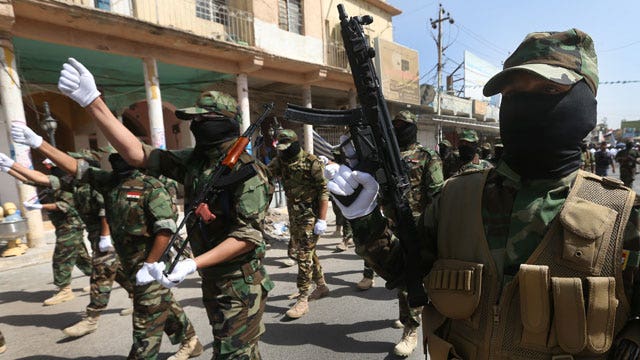Did rise of ISIS take administration by surprise?
Official: Intel community warned about threat
Indications that Iran and Syria are providing military support to Iraq's Shiite government are raising red flags in the Obama administration, with top officials voicing concern that their involvement could create a "flashpoint" that only deepens sectarian tensions in the country.
A senior U.S. official confirmed to Fox News that there are indications Syrian aircraft launched airstrikes against Sunni militant targets in Iraq on Monday. The New York Times also reports that Iran is sending tons of military equipment and supplies into the country in support of Prime Minister Nouri al-Maliki's fellow Shiite government.
Asked about these developments on Wednesday, Secretary of State John Kerry warned about actions "that might exacerbate the sectarian divisions that are already at a heightened level of tension."
He added: "It's very important that nothing takes place that contributes to the extremism or could act as a flashpoint with respect to the sectarian divide," Kerry said, speaking in Brussels in the middle of a multi-country tour aimed at easing the Iraq crisis.
Kerry, noting reports of Iran and Syria intervention, stressed the need for a new Iraqi government, so it can make decisions without "outside forces moving to fill a vacuum."
Speaking in Washington, White House Press Secretary Josh Earnest also said that the solution to the Iraq crisis does not involve militias or the "murderous Assad regime" in Syria.
The involvement of Iran and Syria further complicates the Obama administration's position in trying to shore up the embattled Iraqi security forces as they face radical militants with the Islamic State of Iraq and Syria, or ISIS.
In this case, Iran and Syria -- long-time foes of the U.S. -- find themselves with aligning interests in seeking to stabilize Iraq's government.
However, while Iran wants to preserve Shiite control of Iraq's government, the U.S. is pressing leaders in Baghdad to create a more inclusive political system.
Officials said recent strikes in Iraq appeared to be the work of Syrian President Bashar Assad's government, which is locked in a bloody civil war with opposition groups. The target of the attacks was the extremist group ISIS, which has been fighting along with the rebels opposed to Assad and has since moved swiftly across the border into Iraq.
The White House said intervention by Syria was not the way to stem the insurgents, who have taken control of several cities in northern and western Iraq.
"The solution to the threat confronting Iraq is not the intervention of the Assad regime, which allowed [ISIS] to thrive in the first place," said Bernadette Meehan, a National Security Council spokeswoman. "The solution to Iraq's security challenge does not involve militias or the murderous Assad regime, but the strengthening of the Iraqi security forces to combat threats."
Another U.S. official said Iran has been flying surveillance drones in Iraq.
Meanwhile, The New York Times reported that Iran's involvement has gone beyond flying drones. The Times quoted American officials saying Iran has been sending two daily flights of military supplies to Baghdad. One official described the deliveries as a "substantial amount."
Sen. Saxby Chambliss, R-Ga., told the Times the Iranians "are playing in a big way in Iraq."
For its part, the U.S. government is sending military advisers to Iraq to help Iraqi forces, as well as military personnel to help secure the U.S. Embassy and other facilities.
Fox News' James Rosen and Justin Fishel and The Associated Press contributed to this report.





